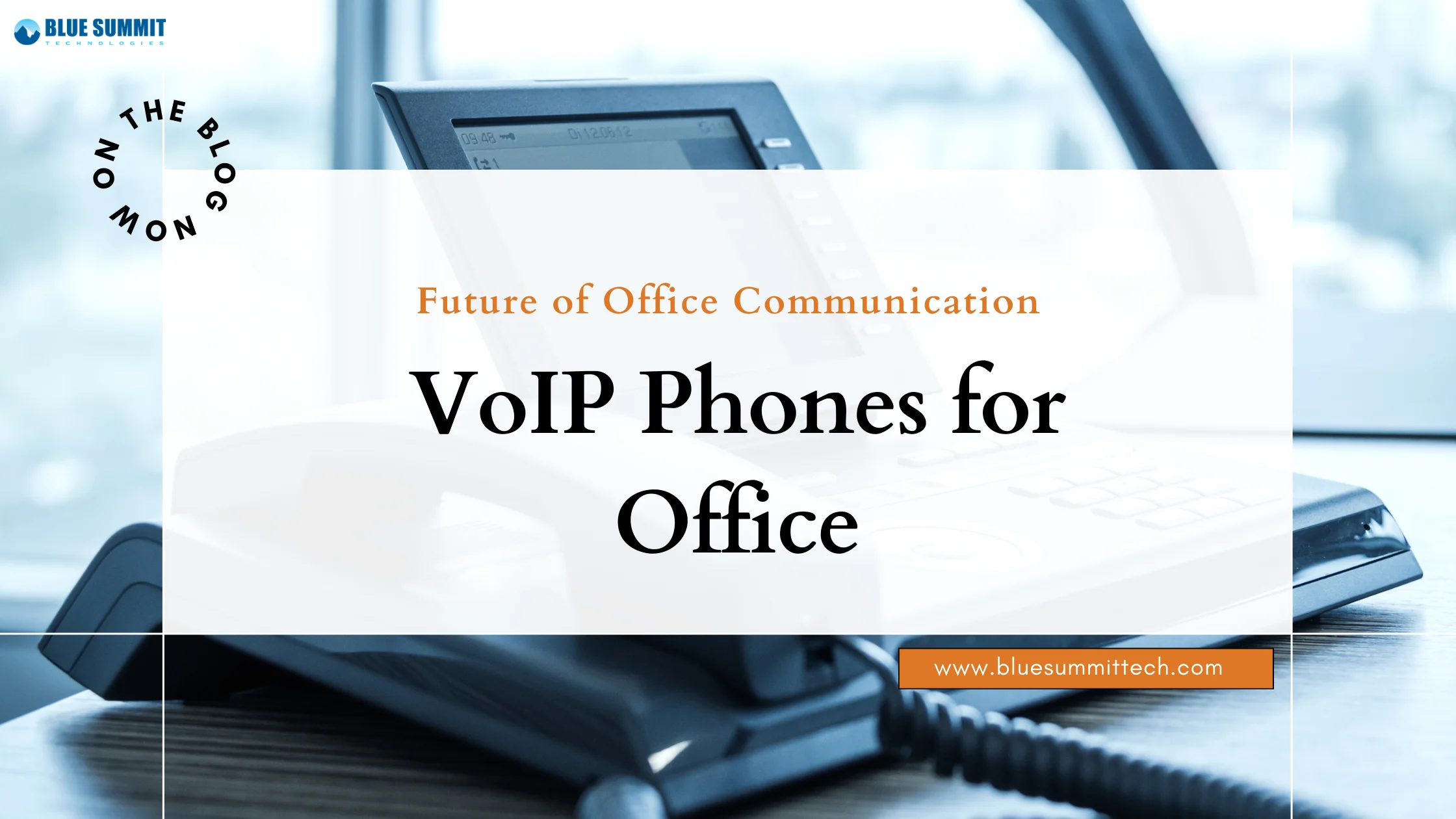
Posted on Tuesday, Sep 03rd, 2024
The Future of Office Communication: VoIP Phones and Their Benefits
Effective communication has always been a crucial for success. Traditional landlines are becoming increasingly obsolete, replaced by more advanced and flexible solutions like VoIP phones. As more businesses seek to enhance their communication infrastructure, VoIP phone for office settings have emerged as the go-to choice. But what exactly is a VoIP phone, and why are they becoming so popular? In this blog, we’ll explore the future of office communication through the lens of VoIP phone software, its benefits, features, installation process, and the software options available.
What is VoIP Phone?
A VoIP phone, or Voice over Internet Protocol phone, is a device that uses the internet to make and receive calls instead of traditional telephone lines. This technology converts voice signals into digital data that travels over the internet, allowing for clearer and more reliable communication. Unlike traditional phones, VoIP phones offer more flexibility and functionality, making them ideal for modern office environments.Why Choose VoIP Phone Software?
1. Cost-Effectiveness
One of the most significant advantages of using VoIP phone for office setting is cost savings. Traditional phone systems often come with high setup costs and expensive monthly bills. VoIP systems, on the other hand, typically have lower setup costs and more affordable plans, especially for long-distance and international calls.2. Scalability
As your business grows, so does your need for a more robust communication system. VoIP phones are highly scalable, allowing you to add or remove lines with ease. This flexibility is particularly beneficial for businesses that are expanding or undergoing structural changes.3. Advanced Features
VoIP phones offer a variety of advanced features that enhance office communication. These features include call forwarding, voicemail to email, auto attendants, conference calling, and integration with other business software like CRM systems. These capabilities help streamline communication and improve overall productivity.4. Mobility
With remote work becoming more common, the need for flexible communication solutions has never been greater. VoIP phones allow employees to make and receive calls from anywhere with an internet connection, ensuring that communication remains seamless even outside the traditional office setting.Key VoIP Phone Features
VoIP phone for office is equipped with a wide range of features specifically designed to enhance business communication and streamline daily operations. Here’s an in-depth look at some of the most valuable features they offer:1. HD Voice Quality
VoIP phones deliver exceptional call quality through high-definition (HD) voice technology, which ensures crystal-clear audio. This enhanced sound quality minimizes misunderstandings, reduces the need for repeated communication, and improves the overall experience of both internal and external calls. Clearer conversations help foster better relationships with clients and colleagues, contributing to a more professional image for your business.2. Call Routing and Forwarding
One of the standout features of VoIP phones is their advanced call routing and forwarding capabilities. These functions automatically direct incoming calls to the correct person or department, whether they are in the office or working remotely. This feature significantly improves customer service by ensuring calls are answered promptly and by the right team members, reducing wait times and enhancing the caller experience.3. Conference Calling
VoIP phones make it easy to host conference calls, allowing multiple participants to join a single call from different locations. This feature is ideal for team meetings, client discussions, and collaborative projects, facilitating efficient communication without the need for everyone to be in the same room. With VoIP, businesses can conduct virtual meetings with high-quality audio, helping to keep remote and in-office teams connected and productive.4. Voicemail to Email Transcription
Managing voicemails can be time-consuming, but with VoIP phones, you can receive written transcriptions of voicemail messages directly to your email inbox. This feature makes it easy to review, archive, and respond to messages without having to listen to each one individually. Voicemail to email transcription saves time, enhances record-keeping, and ensures important messages are never missed, even when you're on the go.5. Integration with Business Tools
Modern VoIP phones seamlessly integrate with a variety of business tools, including email platforms, calendars, Customer Relationship Management (CRM) systems, and other essential software. This integration provides a unified communication experience, allowing users to manage all their communication needs from a single platform. For example, sales teams can instantly log calls in the CRM, or employees can schedule meetings directly from their VoIP interface, thereby enhancing productivity and streamlining workflows.These advanced VoIP phone features make an invaluable asset for any office, providing robust communication solutions that support both current needs and future growth. By adopting VoIP technology, businesses can not only enhance their communication capabilities but also drive greater efficiency and collaboration across their teams.
VoIP Phone Installation: A Simple and Straightforward Process
Setting up a VoIP phone system in your office is relatively easy compared to traditional phone systems. Here’s a basic overview of the installation process:1. Assess Your Internet Connection
Since VoIP phones rely on the internet, a stable and high-speed internet connection is crucial. Evaluate your current internet service to ensure it can handle the increased traffic VoIP phones will generate.2. Choose the Right VoIP Service Provider
Research and select a VoIP service provider that meets your business needs. Consider factors such as cost, features, customer support, and reliability.3. Select Your VoIP Phones
Choose VoIP phone models that suit your office requirements. This could range from basic desk phones to more advanced models with video calling capabilities.4. Set Up VoIP Phone Software
Install the necessary VoIP software provided by your service provider. This software will manage your VoIP settings, such as call routing, voicemail, and other advanced features.5. Configure Your Network
Ensure your office network is properly configured to prioritize VoIP traffic. This may involve setting up VLANs (Virtual Local Area Networks) or Quality of Service (QoS) settings to ensure high-quality calls.6. Test and Train
Once everything is set up, test the system thoroughly to ensure it is working correctly. Provide training for your staff to help them understand how to use the new VoIP system effectively.VoIP Phone Software: Enhancing Communication
The software component of a VoIP phone system is as crucial as the hardware. VoIP phone software is used to manage call settings, monitor usage, integrate with other applications, and provide analytics. Choosing the right VoIP software can significantly enhance the functionality of your VoIP phones. Popular VoIP phone software options include:RingCentral
Known for its user-friendly interface and robust feature set, including team messaging and video meetings.Zoom Phone
Offers seamless integration with Zoom’s video conferencing platform, making it ideal for businesses that frequently use video calls.3CX
A highly customizable VoIP software solution that integrates well with CRM systems and offers advanced call management features.The Future of Office Communication with VoIP
As businesses continue to adapt to the changing work environment, the demand for flexible, reliable, and cost-effective communication solutions like VoIP phones will only grow. VoIP technology represents the future of office communication, offering advanced features, scalability, and significant cost savings over traditional phone systems. By adopting VoIP phone for office, you are not just upgrading your communication tools but also positioning your business for success in the digital age.Conclusion
VoIP phones are transforming how businesses communicate, providing a more dynamic and efficient way to manage calls and collaborate. By understanding what a VoIP phone is, the benefits of using VoIP phones for the office, the installation process, and the available software options, businesses can make informed decisions and stay ahead in the competitive landscape. Embrace the future of office communication today with VoIP phones and experience the difference they can make for your organization.Reach out to Blue Summit for professional installation of VoIP phone services tailored to your business needs.
Blue Summit has collaborated with OdiTek Solutions, a frontline custom software development company. It is trusted for its high service quality and delivery consistency. Visit our partner's page today and get your business streamlined.
REFER TO OTHER RELEVANT CONTENTS

The Future of Office Communication: VoIP Phones and Their Benefits
Effective communication has always been a crucial for success. Traditional landlines are becoming increasingly obsolete, replaced by more advanced and flexible solutions like VoIP phones. As more businesses seek to enhance their communication infrastructure, VoIP phone for office settings have emerged as the go-to choice....
read more
VOIP Services
Today’s global economy requires a global communications strategy. Blue Summit provides VoIP, Telephone, Fax, SMS, MMS, WhatsApp and conferencing services across 180 countries. Whether you are a one person virtual office or a multinational corporation, we can create a cost effective communications plan for you. Contact us today for a free consultation.
read more








